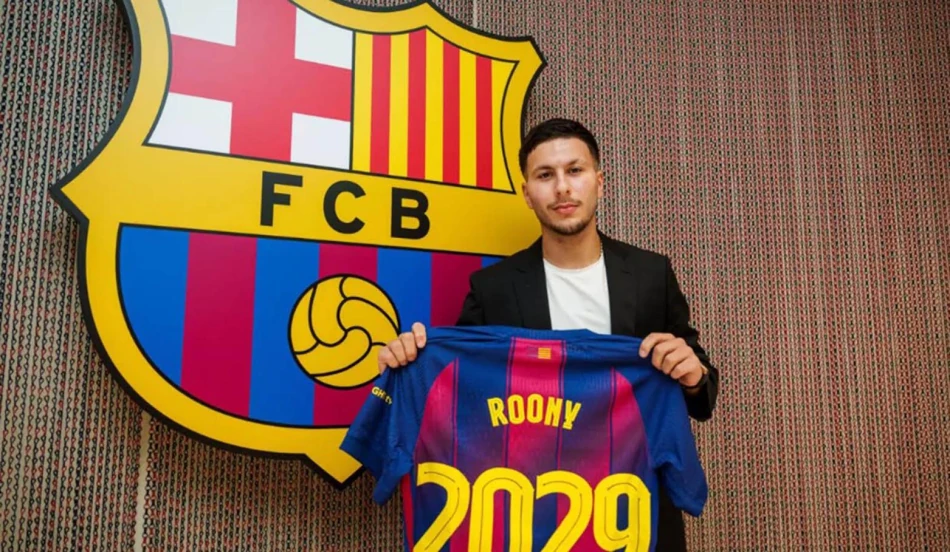
Rising Arab Talents Shaping Barcelona's Footballing Future
Barcelona's Arab Talent Pipeline: A Strategic Shift Toward Multicultural Football Excellence
FC Barcelona is quietly assembling one of Europe's most diverse youth academies, with three promising players of Arab heritage now positioned to shape the club's future. The latest addition, Syrian-origin Roni Bardghji, joins a carefully curated group that reflects both Barcelona's global scouting ambitions and the changing demographics of elite European football.
The New Generation Taking Shape
This summer's acquisition of 19-year-old Bardghji from FC Copenhagen marks a calculated investment in Barcelona's reserve team structure. The Swedish national, born in Kuwait to Syrian parents, brings proven talent after an impressive showing in a friendly against Japan's Vissel Kobe, where he scored a standout goal.
Bardghji joins Croatian midfielder Lovro Cvjetkovic, 18, who carries Algerian heritage through his father. Already dubbed "the new Luka Modric" by Croatian football observers, Cvjetkovic represents the kind of technical midfielder Barcelona has historically prized. His dual nationality has caught the attention of Algeria's national team selectors, creating an interesting dynamic around his international future.
The Crown Jewel: Adam Aznou
Perhaps most intriguing is 12-year-old Adam Aznou, a German-born player of Moroccan descent who has been turning heads at La Masia since 2023. Barcelona coaches are already drawing comparisons to Lionel Messi for the attacking midfielder's playing style—a comparison the club doesn't make lightly.
Aznou's journey through European youth systems—from PSV Eindhoven in the Netherlands to Barcelona's famed academy—illustrates how top clubs now track talent across borders and age groups. His triple nationality (Moroccan, German, Spanish) gives him options that reflect modern football's globalized landscape.
Following the Lamine Yamal Blueprint
This strategy builds directly on Barcelona's success with Lamine Yamal, the Spanish international who chose to represent Spain despite his Moroccan heritage through his father. Yamal's rapid rise from La Masia to Spain's national team demonstrates how Barcelona's multicultural approach can yield immediate first-team dividends.
The club's track record with Moroccan talent runs deep. Three current Morocco internationals—defender Chadi Riad and forwards Abdessamad Ezzalzouli and Ilias Akhomach—all developed through Barcelona's system, proving the pathway from academy to international football remains viable.
Market Dynamics and Strategic Positioning
Barcelona's focus on Arab and North African talent reflects shrewd market positioning. While Premier League clubs dominate transfer headlines with massive fees, Barcelona is identifying undervalued talent in emerging markets where competition remains less intense than traditional European hotbeds.
This approach also serves commercial interests. Arab and North African markets represent significant growth opportunities for European clubs seeking to expand their global fanbase. Players like Bardghji and Aznou could become valuable ambassadors in regions where Barcelona competes with Real Madrid and other elite clubs for supporters.
The Hansi Flick Factor
Under new coach Hansi Flick, known for integrating young talent during his Bayern Munich tenure, these players may find faster pathways to first-team opportunities than in previous eras. Flick's willingness to promote youth could accelerate the timeline for players like Bardghji, who are already showing promise in reserve team appearances.
Broader Implications for European Football
Barcelona's strategy mirrors trends across elite European football, where clubs increasingly view diversity as a competitive advantage rather than simply a social good. The departure of Noah Darwish, a German player of Iraqi origin, to Stuttgart this summer shows how fluid these pathways have become—and how clubs must continually refresh their talent pipelines.
This multicultural approach positions Barcelona ahead of demographic shifts that will define European football's next decade. As second and third-generation immigrant families produce more elite athletes, clubs that establish early relationships with diverse communities will gain sustainable competitive advantages over those that don't.
Most Viewed News

 Sara Khaled
Sara Khaled






